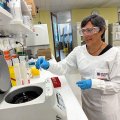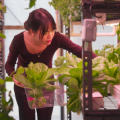The University of Queensland’s Centre for Coal Seam Gas (CCSG) has attracted $3.25 million in funding to further its research capabilities.
CCSG’s latest industry partner, Australia Pacific LNG, has committed the funding to the Centre’s research program, which focuses on the areas of water, geosciences, petroleum engineering and social performance.
CCSG Director Professor Andrew Garnett said Australia Pacific LNG was the fourth industry member to support the work of the Centre, joining QGC, Arrow Energy and Santos.
“We now have a commitment from the four large coal seam gas operators in Queensland, which will allow the Centre greater scope for researching industry-wide topics,” he said.
“Our research will enable the Australian gas sector to better meet the needs of the environment, community, government and industry.”
Australia Pacific LNG Chief Executive Page Maxson said the funding would also contribute to the Centre’s education program, helping to provide skilled graduates to the onshore gas industry.
“We are very pleased to be supporting the Centre, to continue to improve the knowledge of industry practices, and improve social and environmental management and technological innovation,” he said.
Media: Centre for Coal Seam Gas Communications Manager Jacqueline Reynolds, 07 3346 3101; j.reynolds@uq.edu.au.
The Centre for Coal Seam Gas was established in 2011 as a research centre of the Sustainable Minerals Institute at The University of Queensland. It draws together the research capabilities of the University, which has been conducting research into coal seam gas for almost two decades. Funded by the University and industry, the centre has four key research areas: water, geoscience, petroleum engineering and social impact, as well as a focus on education.
Sustainable Minerals Institute
The Sustainable Minerals Institute comprises seven research centres with disciplinary roots in people, environment and production. Established in 2001, the institute’s research covers all facets of mining, from mining geology to health and safety, social responsibility and site rehabilitation. The institute has about 350 staff and postgraduate students.
.jpg)










